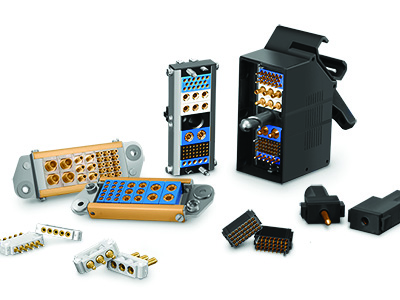Automotive test equipment requires exceptionally robust components to withstand the rigors of the continuous testing of the electronic systems used in today’s ever more complex vehicles. Often these systems are tested on automatic equipment, without the direct involvement of a human operator. The connectors which interface to this equipment must be rugged, compliant to slight misalignments, and able to withstand multiple mating cycles over an extended period of time, without failure.

Download PDF Version
Automotive test equipment requires exceptionally robust components to withstand the rigors of the continuous testing of the electronic systems used in today’s ever more complex vehicles. Often these systems are tested on automatic equipment, without the direct involvement of a human operator. The connectors which interface to this equipment must be rugged, compliant to slight misalignments, and able to withstand multiple mating cycles over an extended period of time, without failure.
Increasingly, these automotive systems manage a variety of critical controls and safety functions on cars and trucks, such as engine control modules, anti-lock braking, automatic braking, lane keeping systems, electronic transmission controls, dynamic cruise control, airbag systems, navigation, infotainment, and even autonomous driving features. Therefore, they must be thoroughly tested to assure that they work, every time, under a wide variety of real-world conditions.
This testing can occur during various steps in the process, such as in-process testing during production, end of the line testing of the device, post production stress testing, as well as in-car testing. And, there can’t be any question that the interconnection, between these systems and the test equipment, is absolutely reliable.
The market for automotive test equipment is growing continuously due to expanding demand for (resulting in increasing production of) new cars and trucks, tougher pollution and fuel economy regulations, the expansion of in-vehicle electronics, as well as enhancements in the design and performance of the test equipment itself. This growth is expected to result in a world-wide market value of $2.9B (US) by the middle of the next decade (according to MarketsandMarkets™ Inc.).
Smiths Interconnect’s Modular L & N Series Connectors:
Interface connectors needed for these types of test systems must be robust, but they must also be flexible, because different types of testers require different interconnects. The rugged modular L & N series from Smiths Interconnect are these types of connectors. With a wide variety of contact modules that can be incorporated, the L Series focuses on signal and power requirements (as shown in the photo on the left), while the N series provides higher density for connectors with up to 100’s of contacts.
Smiths Interconnect’s L series connectors are simple to assemble, based on the principle of building blocks. The system is composed of two elements: modules and frames.
Modules of various styles and contact types, including signal, power, coaxial and fiber optic, can be combined into custom arrangements within a single connector frame. There are also modules available with high speed contacts for transmission of Ethernet signals (for example).
Frames are available in a variety of designs from blind-mating rack & panel to plugs with metal or plastic backshells and ½ turn jackscrews for quick mating and unmating action.
This variety of standard options allows the user to build a connector that addresses and fulfils their exact requirements with off-the-shelf components, eliminating the cost and lead-time of custom connector designs.
Ideal for rugged rack & panel applications, L Series connectors utilize the unparalleled performance of Hypertac® hyperboloid contact technology to provide high cycle life, low insertion/extraction forces, low contact resistance, higher current ratings, and immunity to shock and vibration. This ensures smooth and easy mating with maximum performance in connectors with numerous contacts.
The contacts are mounted in small removable plastic blocks for easy assembly and repair. The frames which hold the modules in position range from basic, only consisting of two side rails and end caps, to more complex, including jackscrews, hoods and cable clamps. To conform to almost any combination of modules, all frames are available in numerous lengths. With the L Series, specially designed connectors can be purchased quickly and inexpensively, eliminating the need for custom tooling.
Smiths Interconnect’s N Series high density, modular cable and rack & panel connectors (shown at right) use a similar system to the L series, with modules which provide higher density, typically with signal contacts, but power and coax contact modules are also available to meet the needs of a wide variety of applications.
Conclusion:
For decades, manufacturers of test equipment and test fixtures have relied on Smiths Interconnect’s modular L and N series connectors to provide reliability and ensure that their equipment performs as anticipated Therefore, as automotive test equipment continues to meet the expectations of today’s increasingly complex vehicle systems, Smiths Interconnect’s connectors will be there to make the designer’s task easier and worry-free.

